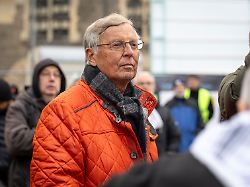Traffic light talk near Illner
“We will lose this land in the commune”
By Marko Schlichting
April 5, 2024, 5:17 a.m
Listen to article
This audio version was artificially generated. More info | Send feedback
Never has a federal government been as unpopular as the current one. Will the traffic lights survive this year? This is what Maybrit Illner wants to know from her guests. The CDU election campaigner Bosbach does not believe in an early end to the coalition.
The traffic light coalition has lost the trust of many people in Germany. ZDF talker Maybrit Illner actually wants to find out on her show whether the traffic light coalition can survive the super election year of 2024. Only Wolfgang Bosbach from the CDU answers the question. The other guests debate the current problems in Germany – and how they could be solved.
Bosbach cannot imagine that the traffic light coalition will fail. “If there were new elections, none of the three parties would have an advantage. All three of them would lose. And the traffic light would almost certainly no longer have a majority in elections either. That’s why they will continue to cling to each other and hope that in the regular one The election date in September next year looks better.” The current problems would also exist if the Union were in government. “We would certainly make one or two decisions differently, and in my opinion better.” And further: “We are currently losing political and economic stability, and the Union would ensure that this changes.”
The former CDU politician will support his party in the election campaign in Brandenburg, Thuringia and Saxony, where the population will elect new state parliaments in September. According to surveys, the AfD is currently ahead in all three federal states. However, the author of Spiegel and Tagesspiegel, Sabine Rennefanz, does not believe that it will stay that way. She assumes that the democratic parties will pick themselves up again in the last few weeks before the elections. “The problem is the total focus on the AfD, as if there were only AfD voters in the East. That’s simply not true.” Seventy percent of voters in East Germany would vote for another party. In addition, the party landscape is very much in flux due to the founding of the Alliance Sahra Wagenknecht and the Union of Values. “I would focus my energies on that,” says the journalist.
Schwesig is also not happy with the traffic lights
The Prime Minister of Mecklenburg-Western Pomerania, Manuela Schwesig from the SPD, is also certain: the democratic parties can still turn things around in at least two of the three eastern German states, in Brandenburg and Saxony. Schwesig does not agree 100 percent with the traffic light coalition’s policy. The heating law was wrong, as was the abolition of agricultural diesel. “But there are also a lot of good decisions,” she says: “For example, the federal government has taken up the proposal to cap gas and electricity prices, that child benefit has been increased, and that there is a lot of help such as energy money.” But her job as Prime Minister is to also identify problems. “We lose the remaining trust when people have the feeling that they are talking things up.”
If Dirk Neubauer has his way, there is too much criticism in Germany. Neubauer was a member of the SPD until three years ago. He is now a non-party district administrator for Central Saxony, where the university town of Freiberg is located. He says the situation in Germany is actually much better than the mood. “What I miss, and what I think many people in our region miss, is getting orientation.” He couldn’t understand why politicians from all parties talked the country into sackcloth every day. “We have a lot of challenges, that’s undisputed. But I have a lot of business contacts in our district that don’t reflect what we’re discussing at all.” For example, he is annoyed by the discussion about energy prices. Managers at Wacker-Chemie told him that this was not a stressful issue. For them, a long-term perspective is much more important. In order for companies to invest in this country, there must be a “Plan 2045”. “We’re talking about a lot of money. The willingness is there. And I don’t understand why we can’t manage to collect it and turn it into a sensible plan.”
Refugee policy and payment card
What also bothers Neubauer: There is too much discussion in Berlin, but the solutions are a long time coming. That’s why he introduced the payment card for refugees in his district – at his own risk. And the former Social Democrat sees only advantages in the card. Almost no one pays in cash anymore, he says. He knows that his district financed the introduction of the payment card solely by eliminating the costs of transporting money and guarding it. “But we’re going one step further: We’re going to combine this with the digital welcome center and we’re introducing AI systems,” says Neubauer happily. He has concluded contracts for the introduction of the payment card, which he can terminate on a monthly basis. “The federal government should surprise us with a uniform solution in 2030.”
Neubauer is clear: “We have to take such steps now.” Because he has understood one thing: “We are discussing federal elections and state elections here. But we will lose this country in the municipality.” That is the AfD’s strategy: it wants to create a foundation in the communities. That’s why he appeals: “Let’s solve problems together! Because only if we did that would this party and all the others on the fringes be voted out.”
